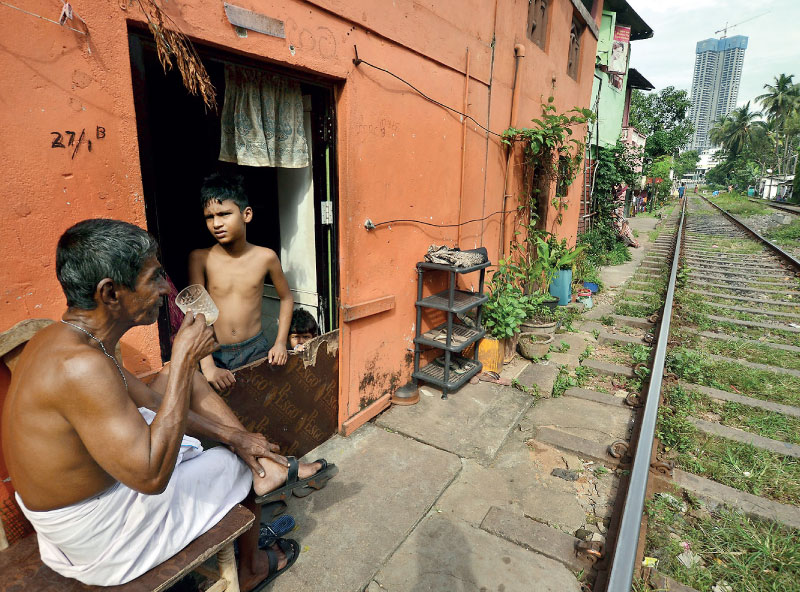Tuesday Feb 17, 2026
Tuesday Feb 17, 2026
Wednesday, 15 September 2021 00:12 - - {{hitsCtrl.values.hits}}

Sri Lanka was a prosperous country a few decades ago but currently is faced with many issues. It has deviated from its true potential for growth and prosperity – Pic by Shehan Gunasekara
 Sri Lanka was a prosperous country a few decades ago but currently is faced with many issues. A survey was carried out among a group of 60 academics and professionals and other thinkers based in Sri Lanka and overseas. The purpose of the survey was to gather information on progress in Sri Lank over time in terms of socio-cultural, political, economic and environmental aspects and to highlight limiting factors.
Sri Lanka was a prosperous country a few decades ago but currently is faced with many issues. A survey was carried out among a group of 60 academics and professionals and other thinkers based in Sri Lanka and overseas. The purpose of the survey was to gather information on progress in Sri Lank over time in terms of socio-cultural, political, economic and environmental aspects and to highlight limiting factors.
The survey probed on the historical evolution, focusing on two questions: “What went wrong?” (since independence in 1948 to today) and “What is Sri Lanka good at?”
The information collected provided a useful starting point to a deeper probe on the questions posed above. According to the survey most of the participants agreed that Sri Lanka is in dire straits in many aspects, including the economy, the political structure, social order and the environment. As revealed from the survey answers, the country is sliding fast towards an abyss with no prospects for improvements in any sphere.
A significant proportion of the survey respondents opined that Sri Lanka can still reach a state of prosperity, provided that the country implements a set of corrective measures without further delay. Most respondents identified that Sri Lanka has several advantages over many developing countries or even comparable to some high-income countries regarding its resource endowment.
What is Sri Lanka good at?
The survey revealed Sri Lanka possesses three main resources namely: human resources, natural resources and manmade resources. Firstly, Sri Lankans are talented, creative and resourceful and the challenge before the country is to harness the innate talents of Sri Lankans at the individual level and design ways to inculcate their capacity to cooperate within the larger society for the greater good.
Secondly, regarding natural resources, Sri Lanka has several climatic zones, ranging from mild temperature to warm weather and wet/dry zones and many natural resources in abundance including minerals such as gems, ilmenite and titanium.
Thirdly, in terms of man-made resources, Sri Lanka inherited an excellent built environment which includes tank irrigation system and road network. According to the survey there is potential for medical tourism, local fruits and geographical locations as foreign exchange earners for the country.
There is a functional plantations agriculture sector, most notably, the tea plantations which continue to produce high-quality tea, providing much-needed foreign currency and a stable income source. However, Sri Lanka’s development drive has failed to produce results so far due to the inefficient use of most of the resources mentioned.
What went wrong?
The survey revealed that Sri Lanka as a country has deviated from its true potential for growth and prosperity. Understanding the historical evolution of the issues faced by Sri Lanka and their root-causes or in other words “what went wrong?” is imperative for thinking afresh about bringing back Sri Lanka to a new, sustainable, people-friendly development trajectory.
By classifying all the answers received through the survey, it was possible to identify ten broadly defined root-causes or challenges, which are causing the country to slide fast towards an abyss with no prospects for improvements in any sphere of development. The survey also highlighted the resource-base that Sri Lanka possesses or in other words, “what is Sri Lanka good at?” which can support growth and prosperity.
10 challenges
(1) Practice of democracy
One respondent summarised the ‘practice of democracy’ as: “not understanding democracy and freedom”. Another respondent summarised this as: “short-sighted behaviour of the majority of the people when exercising their democratic rights”. At a more fundamental level, this could be due to the ignorance of the majority of citizens, which allowed political parties and politicians to exploit citizens’ rights for their benefit. Some respondents also opined that some Sri Lankans believe in the feudalistic system, where the master is supposed to decide and protect the subjects while the subjects offer their loyalty.
(2) Attitudes and ethical behaviour
Although Sri Lankans are considered to have historically maintained high standards of ethical behaviour, with tolerance, caring for one another and hospitality, some responses indicated that these qualities have been deteriorating and replaced by greed, selfishness, intolerance and disregard for humans and animal lives.
(3) Economic mismanagement
Several respondents identified ‘economic mismanagement’ as one of the fundamental root-causes of Sri Lanka’s failure as a nation to advance. As a result of economic mismanagement by successive governments, Sri Lanka was unable to generate a liveable income for most people, provide employment opportunities for the youth, maintain price stability, or generate adequate national savings and earn foreign exchange.
These failures have led to Sri Lanka’s inability to lift the quality of life in general and many people were pushed in to poverty, food insecurity and destitution.
(4) Environment mismanagement
The destruction of Sri Lanka’s rich flora and fauna systems has accelerated overtime, leading to the loss of much-valued bio-diversity and its capacity to regenerate. Sri Lanka’s forest cover is fast declining despite claims to protect them. The so-called human-elephant conflict is simply a manifestation of the declining forest cover in Sri Lanka, as humans encroach natural habitats.
(5) Government fiscal responsibility
Irresponsible fiscal management has led to use of government income and expenditure that ended up in wastes. Many respondents highlighted massive government investments on projects with insignificant returns and that do not enhance the country’s productive capacity leading to a significant imbalance between internal (fiscal balance) and external (trade and foreign exchange) accounts.
(6) Judiciary system
The participants of the survey have mentioned that people tend to disrespect law and order due to various reasons and many opined that there is a tendency to lose people’s confidence in the judicial system. Unless Sri Lanka can restore the supremacy of the Judiciary and equality under the law, there is little hope to regain peoples’ trust in the Judiciary.
(7) Education system
Respondents highlighting many examples indicated that the current education system has failed to produce creative minds and skilful people with the right attitudes. One example is the failure of government officials to think and act creatively.
(8) Utilisation of human resources
Respondents pointed out that a significant reason for the development failure in Sri Lanka is the non-usage of appropriate human resources in key and responsible positions in line with the best expertise and skills, regardless of their social status, family connections, and other favours. This has caused brain-drain, depriving the country’s potential for producing goods and services within the country for domestic and overseas mark.
(9) Foreign debt burden
As a result of short-sighted economic and political decisions by successive governments, especially obtaining foreign loans for non-productive projects and activities, Sri Lanka has ended up in a ‘debt trap’, making it extremely difficult for managing the scarce foreign resources.
(10) International relations and geo-politics
It is well-known fact that Sri Lanka has gained interest among the world’s superpowers due to Sri Lanka’s strategic location. The survey revealed that power struggles by foreign superpowers have severe effects on Sri Lanka’s political and economic independence.
Summary
Sri Lanka was a prosperous country a few decades ago but currently is faced with many issues. It has deviated from its true potential for growth and prosperity. Understanding “what went wrong?” or put differently, the historical evolution of issues faced by Sri Lanka and their root-causes is imperative for thinking afresh about bringing back Sri Lanka to a new, sustainable, people-friendly development trajectory.
Based on the survey findings, 10 challenges of the current state of affairs of the country have been identified. The survey findings also highlight “what is Sri Lanka good at?” or in other words, the resource-base that Sri Lanka possesses which can support igniting growth and prosperity.
Final remarks
Further delving into the 10 challenges is required to identify a path(s) to a prosperous future for Sri Lanka. This task is left for the next stage of this study.
(This is the shortened version of detailed report of about 8 pages. In order to download the detailed report please use the link: https://newhorizonsplus.org/publications/. Please send your comments to: Seniors for Motherland. Email: [email protected]. Web: www.newhorizonsplus.org/public-awareness/)
(The writer is a member of Seniors for Motherland. This is a volunteer social group established in 2019 that wishes betterment of our motherland, Sri Lanka. The author wishes to express his sincere thanks to all those who responded to the survey. He is especially grateful to those who volunteered to review the survey report and made valuable comments. His special thanks goes to W.A Jayasundara, Attorney-at-Law, who was instrumental in design of this survey research.)